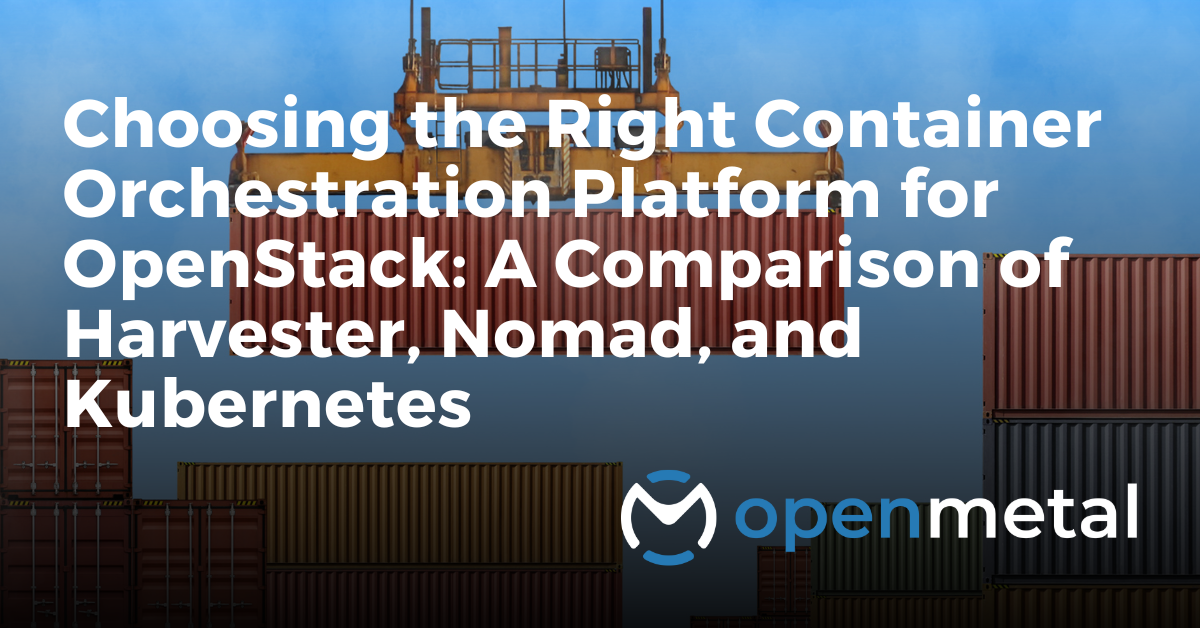When it comes to deploying container orchestration platforms on OpenStack, three popular options stand out: Harvester, Nomad, and Kubernetes. Each platform has its unique strengths and advantages, making it essential to understand their key features and suitability for different scenarios. In this article, we will compare these platforms, focusing on their deployment and setup on OpenStack.
But first the basics: What is a container orchestration platform? It is a software tool that automates the deployment, scaling, and management of containerized applications. Containers are a way of packaging software to run on any infrastructure, regardless of the underlying operating system.
With a container orchestration platform, you can easily deploy and manage containers at scale without worrying about the underlying infrastructure. These platforms offer several benefits, such as increased scalability, improved reliability, and reduced complexity.
To put it in perspective, imagine being a conductor of an orchestra, ensuring that musicians playing different instruments are synchronized. Similarly, a container orchestration platform acts as a conductor for containers, ensuring they run correctly and communicate effectively with each other.
Now, let’s examine each platform.
Kubernetes on OpenStack
Kubernetes is a mature and widely adopted container orchestration platform. Deploying Kubernetes on OpenStack is more complexity due to the need for integrating various components. It requires dedicated efforts in configuring and managing the cluster, making it suitable for users with expertise in container orchestration and a need for advanced features and customization.
Learn more about running Kubernetes workloads on OpenStack here.
Harvester on OpenStack
Harvester is an open source platform that leverages the power of Kubernetes and OpenStack. It offers a user-friendly experience with a simplified deployment process. Harvester’s intuitive interface allows users to create, manage, and scale clusters easily. Harvester was designed to simplify the deployment and management of virtual machines (VMs) in a Kubernetes environment.
Nomad on OpenStack
Nomad is a flexible and lightweight workload orchestrator. Nomad is designed to be easy to install, configure, and operate, making it a good choice for smaller deployments or organizations that prefer a simpler toolset. Unlike Kubernetes which primarily focuses on container orchestration, Nomad has a broader scope and supports various types of workloads, including containers, virtual machines (VMs), and even standalone executable files.
Nomad can be deployed on OpenStack, but it requires additional configuration and customization. Setting up Nomad on OpenStack may be more suitable for advanced users with technical expertise. It provides users more fine-grained control over deployments.
Container Orchestration Platform Feature Comparisons
Here is a comparison of the app native features of Harvester, Nomad, and Kubernetes when deployed on OpenStack:

All three platforms offer a comprehensive set of app native features when deployed on OpenStack.
When it comes to choosing the best container orchestration platform for your OpenStack deployment, it’s important to consider your specific needs and requirements.
While Harvester, Nomad, and Kubernetes all offer a comprehensive set of app native features on OpenStack, each platform has its own strengths and considerations to keep in mind.
Harvester is an open source project that simplifies the deployment Kubernetes on OpenStack. It provides a user-friendly interface and seamless integration with OpenStack, making it easy to deploy and manage web applications and process large datasets.
Harvester integrates Kubernetes and KubeVirt, a virtual machine management platform, to provide VM orchestration capabilities alongside container orchestration. Harvester complements Kubernetes by enabling the management of both containers and virtual machines within the same ecosystem. It is well-suited for web hosting, big data analytics, microservices, and batch processing.
Nomad is a newer container orchestration platform that is designed to be simpler and more lightweight than Kubernetes. It supports web hosting, big data analytics, microservices, and batch processing. It offers flexibility and versatility in workload orchestration, but may require more configuration compared to Harvester.
Nomad is a good choice for organizations that want a platform that is easy to use and manage.
Kubernetes is the most popular container orchestration system. Kubernetes is known for its scalability, reliability, and flexibility. It is a complex platform, but it has a large community of users and developers who provide support and documentation.
Kubernetes is widely recognized for its web hosting, big data analytics, microservices, and batch processing capabilities. In addition, it excels in distributed computing, making it a suitable choice for applications that require multiple nodes to collaborate effectively.
In conclusion, while Harvester, Nomad, and Kubernetes share many similar app native features, their deployment and management approaches, as well as additional capabilities like distributed computing, can influence the best fit for your specific use case within the context of OpenStack.
If you are looking for a platform that is scalable, reliable, and flexible, then Kubernetes is a good choice.
If you are looking for a platform that is easy to use and manage, then Nomad is a good choice.
If you are new to Kubernetes, then Harvester may simplify your experience. On-Demand OpenStack by OpenMetal can support all three container platforms.
More from OpenMetal…

Originally developed by Google, Kubernetes is an open source platform that automates the management of applications through containers. Often referred to as a container management tool, it automates container deployment, container scaling (descaling) and container load balancing.

Unleashing the Potential of Cloud-Based Applications with OpenShift
Cloud-based applications offer a wide range of benefits, from improved scalability and flexibility to cost savings and increased efficiency. However, deploying and managing cloud-based applications can be complex.
This is where OpenShift comes in…Read More

Comparing Deployment Methods for Kubernetes on OpenStack
In this blog post Micheal Levan covers deploying Kubernetes on OpenStack using Kubespray, Rancher, Portainer, and Kubeadm. He dives into the pros and cons of each deployment, provides and overview of each method, explains why they exist and helps your decide which m.. Read More
Test Drive
For eligible organizations, individuals, and Open Source Partners, Private Cloud Cores are free to trial. Apply today to qualify.
Subscribe
Join our community! Subscribe to our newsletter to get the latest company news, product releases, updates from partners, and more.




































